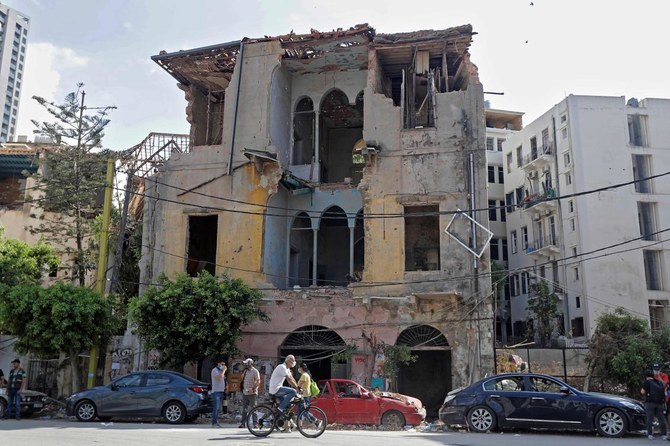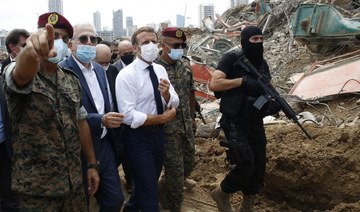BEIRUT: Beirut residents are being urged not to sell their homes or real estate following the devastating explosion that laid waste to swathes of Beirut, as brokers swoop in to buy shattered buildings.
Last week’s explosion at the Port of Beirut has so far killed 171 people, injured more than 6,000 and displaced hundreds of thousands of people from their homes. Dozens remain missing. The World Health Organization has estimated that 50 percent of Beirut hospitals are “out of service” due to the explosion.
The Tuesday blast has seen people take to the streets to pick up the pieces and clean up the chaos, even as Lebanon struggles to overcome the coronavirus pandemic and severe economic, financial and political difficulties.
Small cards have been fixed to damaged cars in neighborhoods destroyed by the blast. They read: “If the car is for sale, call the number on the card.”
The cards were spotted in areas of Gemmayzeh, Mar Mikhael, Al-Mdawar and Karantina near the port area. Residents have complained that brokers are “touring their buildings to make offers” to buy houses and real estate in exchange for large sums of cash in dollars.
The devastated areas include heritage buildings, and the head of the Order of Engineers in Lebanon Jad Tabet estimated the number of old buildings threatened with total or partial collapse ranged from 50 to 60.
Many residents in these buildings are either tenants or poor owners who are unable to restore what has been destroyed, especially in light of Lebanon’s severe economic crisis and the collapse of the lira against the US dollar.
The behavior of the brokers has caused anxiety for other reasons, too. The areas destroyed in the explosion are predominantly Christian.
Beirut’s port was the start of the 1975 Green Line that divided the capital into east and west, a situation that remained until 1990 when the war ended. Although the Green Line was abolished, the demographic division created by the war is the same but for a few exceptions.
In the past two days there have been reports that political or partisan elements in the country are “taking advantage of the opportunity to infiltrate” these areas.
“News about the existence of brokers is widely circulated in the affected areas,” MP George Okais told Arab News. “There are wealthy owners, old owners who are poor and other owners whose properties have been passed from their parents and grandparents and cannot be sold due to the difficulty of the heirs to reach an agreement. It seems that some people want to exploit the people’s feelings of disgust and anger as well as their intentions to emigrate from Lebanon, by offering them attractive amounts to buy these properties whether heritage buildings, or old buildings.”
The Orthodox Gathering appealed to the owners of buildings and real estate in the affected areas not to give in to despair or frustration, even though these feelings were justified in the face of such horror. It urged people to refrain from selling their property and to hold on to the “land and stone, symbol of their existence.”
Walid Jumblatt, head of the Progressive Socialist Party, warned the municipality of Beirut against committing the crime of destroying heritage in Gemmayzeh, Mar Mikhael and Ashrafieh for the benefit of some brokers. “The Municipality of Beirut has enough money to restore the heritage and shelter the victims and help them,” he said.
Talal Al-Doueihy, head of the “Lebanese Land – Our Land Movement,” who has been active for the past two years to prevent the sale of lands belonging to the Lebanese, particularly Christians, said: “Some people informed me that lawyers and agents of real estate developers have expressed interest in buying their damaged or destroyed properties.”
He spoke of the “unrealistic amounts” offered to people — $8,000 dollars per square meter.
“The demographic change in these areas may be or may not be on the table, but it is our duty to offer solutions and tell people to not sell their land and to not leave Lebanon no matter what sect they belong to,” said Okais. “The main focus is to provide people with financial support. That is what we are working on right now.”
The Lebanese Ministry of Culture has decided to “prevent any transaction of sale, disposal or insurance relating to the damaged properties and prevent their registration in real estate departments until after the completion of all repair work and after the approval of the ministry in accordance with the rules relating to the protection of historical and heritage buildings.”
The World Maronite Union accused “rich and wealthy people, owners of mafia money that sabotaged Lebanon, owners of smuggling and drugs money sponsored by Hezbollah in addition to Iran’s money, of trying to change the cultural and demographic face of Beirut.”
It feared that people would act “unconsciously and sign contracts and agreements that would steal from them and deprive them of their history and the future of their children.”
Rumors about further explosions in the Lebanese capital are also causing fear and confusion. The rumors have been attributed to the Lebanese Red Cross, the French embassy and also UN forces in Lebanon — with all three quick to deny them.
The embassy rejected the content of an audio recording that claimed the diplomatic mission had warned its citizens from going to Beirut between Aug. 13 and 15, stressing that the audio message was old and was being circulated “with the aim of misleading people and provoking panic.”
The United Nation Interim Force in Lebanon (UNIFIL) also denied the veracity of the recording. Its spokesman Andrea Tenenti said: “The audio recording claiming that the UNIFIL has warned of a terrorist act in areas of Beirut is unfounded. It only aims at creating confusion in these exceptional circumstances.”
Cash for chaos as brokers swoop in on battered Beirut after blast
https://arab.news/5v2ty
Cash for chaos as brokers swoop in on battered Beirut after blast

- Explosion left hundreds of thousands homeless
- WHO says 50% of hospitals “out of service”
Western nations urge Israel to comply with international law in Gaza

All countries belonging to the Group of Seven (G7) major democracies, apart from the United States, signed the letter, along with Australia, South Korea, New Zealand, the Netherlands, Denmark, Sweden and Finland.
The five-page letter comes as Israeli forces bear down on the southern Gaza city of Rafah as part of its drive to eradicate Hamas, despite warnings this could result in mass casualties in an area where displaced civilians have found shelter.
“In exerting its right to defend itself, Israel must fully comply with international law, including international humanitarian law,” the letter said, reiterating “outrage” for the Oct. 7 Hamas raid into Israel which triggered the conflict.
Israel denies blocking humanitarian aid and says it needs to eliminate Hamas for its own protection.
The Western nations said they were opposed to “a full-scale military operation in Rafah” and called on Israel to let humanitarian aid reach the population “through all relevant crossing points, including the one in Rafah.”
“According to UN estimates, an intensified military offensive would affect approximately 1.4 million people,” the letter said, underscoring the need “for specific, concrete and measurable steps” to significantly boost the flow of aid.
The letter recognizes Israel made progress in addressing a number of issues, including letting more aid trucks into the Gaza Strip, the reopening of the Erez crossing into northern Gaza and the temporary use of Ashdod port in southern Israel.
But it called on Prime Minister Benjamin Netanyahu’s government to do more, including working toward a “sustainable ceasefire,” facilitating further evacuations and resuming “electricity, water and telecommunication services.”
Since Oct. 7 Israel’s Gaza offensive has killed more than 35,000 Palestinians, local health officials say.
Gaza fighting rages after Israel vows to intensify Rafah offensive

- Fierce battles overnight in and around the Jabalia refugee camp in the north of the war-ravaged Gaza Strip
- Israeli warships launched strikes on Rafah, on the border with Egypt
RAFAH: Fighting raged Friday in Gaza after Israel vowed to intensify its ground offensive in Rafah despite international concerns for the hundreds of thousands of displaced Palestinians in the southern city.
With Gazans facing hunger, the US military said “trucks carrying humanitarian assistance began moving ashore via a temporary pier” it set up to aid Palestinians in the besieged territory.
Witnesses reported fierce battles overnight in and around the Jabalia refugee camp in the north of the war-ravaged Gaza Strip.
Israeli helicopters carried out heavy strikes around Jabalia while army artillery hit homes near Kamal Adwan hospital in the camp, they said.
The bodies of six people were retrieved and several wounded people were evacuated after an air strike targeted a house in Jabalia, Gaza’s Civil Defense agency said.
Rescue teams were trying to recover people from under the rubble of the Shaaban family home on Al-Faluja Street in the camp, it added.
Witnesses said Israeli warships launched strikes on Rafah, on the border with Egypt, where more than 1.4 million Palestinian civilians have been sheltering.
Hamas’s armed wing, the Ezzedine Al-Qassam Brigades, said in a statement that it “targeted enemy forces stationed inside the Rafah border crossing... with mortar shells.”
The war broke out after the October 7 attack on southern Israel which resulted in the deaths of more than 1,170 people, mostly civilians, according to an AFP tally of Israeli official figures.
Out of 252 people taken hostage that day, 128 are still being held inside Gaza, including 38 who the army says are dead.
Israel vowed in response to crush Hamas and launched a military offensive on Gaza, where at least 35,303 people have been killed since the war erupted, according to data provided by the health ministry of Hamas-run territory.
Intensified ground operations
Israel has vowed to “intensify” its ground offensive in Rafah, in defiance of global warnings over the fate of Palestinians sheltering there.
Israel’s top ally the United States has joined other major powers in appealing for it to hold back from a full ground offensive in Rafah.
But Israeli Defense Minister Yoav Gallant on Thursday said “additional forces will enter” the Rafah area and “this activity will intensify.”
Prime Minister Benjamin Netanyahu insisted Thursday that the ground assault on Rafah was a “critical” part of the army’s mission to destroy Hamas and prevent any repetition of the October 7 attack.
“The battle in Rafah is critical... It’s not just the rest of their battalions, it’s also like an oxygen line for them for escape and resupply,” he said.
The Israeli siege of Gaza has brought dire shortages of food as well as safe water, medicines and fuel for its 2.4 million people.
The arrival of occasional aid convoys has slowed to a trickle since Israeli forces took control last week of the Gaza side of the Rafah crossing.
UN denounces ‘intimidation and harassment’ of lawyers in Tunisia

- Civil society in the North African country condemned the arrests as a crackdown on dissent in the country
- The European Union expressed concern this week over the arrests
GENEVA: The United Nations on Friday denounced recent arrests of lawyers in Tunisia, saying the detentions, which have also included journalists and political commentators, undermined the rule of law in the North Africa country.
“Reported raids in the past week on the Tunisia Bar Association undermine the rule of law and violate international standards on the protection of the independence and function of lawyers,” Ravina Shamdasani, spokeswoman for the Office for the Coordination of Humanitarian Affairs (OCHA), told reporters in Geneva.
“Such actions constitute forms of intimidation and harassment.”
The arrests have sparked condemnations by Tunisia’s civil society and have sparked an international backlash, which Tunisia’s President Kais Saied has slammed as foreign “interference.”
Civil society in the North African country condemned the arrests as a crackdown on dissent in the country that saw the onset of the Arab Spring.
The European Union expressed concern this week over the arrests, while the United States said they contradicted the universal rights guaranteed by the country’s constitution.
Saied, who seized sweeping powers in 2021, on Thursday ordered the foreign ministry to summon ambassadors of several countries and inform them that “Tunisia is an independent state,” in a video released by his office.
Lebanon state media reports fresh Israeli strikes in south

- Israeli strikes targeted Najjariyeh and Addousiyeh
- The NNA reported “victims” without elaborating
BEIRUT: Israeli air strikes hit on Friday an area of southern Lebanon far from the border, Lebanese official media said, following days of escalating clashes between Israel and armed group Hezbollah.
The Iran-backed group, a Hamas ally, has traded cross-border fire with Israeli forces almost daily since the Palestinian group’s October 7 attack on southern Israel that sparked the war in Gaza, now in its eighth month.
Lebanon’s state-run National News Agency said “Israeli strikes targeted Najjariyeh and Addousiyeh,” two adjacent villages about 30 kilometers (19 miles) from the Israeli border just south of the coastal city of Sidon.
The NNA reported “victims” without elaborating, and an AFP photographer saw ambulances heading to the targeted sites.
The strikes hit a pickup truck in Najjariyeh and an orchard, the photographer said.
Hezbollah — which has intensified its cross-border attacks in recent days, prompting Israeli strikes deeper into Lebanese territory — announced Friday it had launched “attack drones” on Israeli military positions.
It came a day after the powerful Lebanese group said it had attacked an army position in Metula, a border town in northern Israel, wounding three soldiers.
Hezbollah said the attack was carried out with an “attack drone carrying two S5 rockets,” which are normally launched from jets.
Also on Thursday the group announced the deaths of two of its fighters in Israeli strikes on southern Lebanon. The NNA said they were killed when their car was targeted.
Hezbollah earlier on Thursday said it had launched dozens of Katyusha rockets at Israeli positions in the annexed Golan Heights.
Israel retaliated with overnight air raids on Lebanon’s eastern Baalbek region, a Hezbollah stronghold near the Syrian border.
Earlier this week Hezbollah said it had targeted an Israeli base near Tiberias, about 30 kilometers from the Lebanese border — one of the group’s deepest attacks into Israeli territory since clashes began on October 8.
The Wednesday strike came a day after the death of a Hezbollah member, which Israel said was a field commander, in an attack on southern Lebanon.
The cross-border fighting has killed at least 415 people in Lebanon, mostly militants but also including 80 civilians, according to an AFP tally.
Israel says 14 soldiers and 10 civilians have been killed on its side of the border.
UN rights chief warns Sudan commanders of catastrophe in Al-Fashir

- Violence escalated near Sudan’s Al-Fashir this week
GENEVA: The UN human rights chief said on Friday he was “horrified” by escalating violence near Sudan’s al-Fashir and held discussions this week with commanders from both sides of the conflict, warning of a humanitarian disaster if the city is attacked.
Hundreds of thousands of people are sheltering in al-Fashir without basic supplies amid fears that nearby fighting will turn into an all-out battle for the city, the Sudanese army’s last stronghold in the western Darfur region.
Its capture would be a major boost for the rival Rapid Support Forces (RSF) as regional and international powers try to push the sides to negotiate an end to a 13-month war.
Ravina Shamdasani, spokesperson for High Commissioner Volker Turk, said Turk had held two parallel phone calls this week with Sudan army chief General Abdel Fattah al-Burhan and the leader of the RSF, Mohamed Hamdan Dagalo, urging them to de-escalate.
"The High Commissioner warned both commanders that fighting in (al-Fashir), where more than 1.8 million residents and internally displaced people are currently encircled and at imminent risk of famine, would have a catastrophic impact on civilians, and would deepen intercommunal conflict with disastrous humanitarian consequences," she said at a UN press briefing in Geneva, adding that Turk was "horrified" by recent violence there.
The UN human rights office said at least 58 people had been killed around al-Fashir since last week.




















